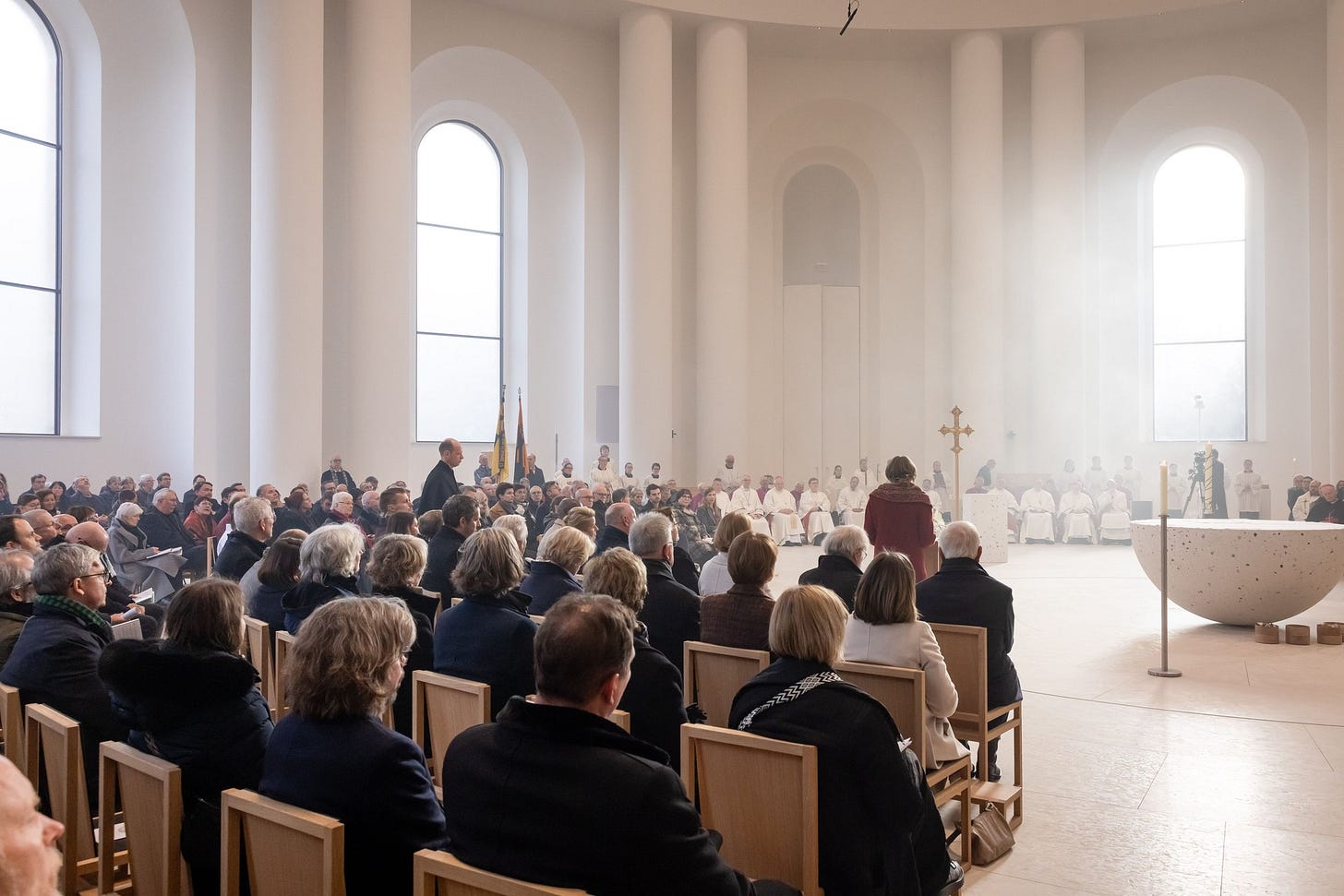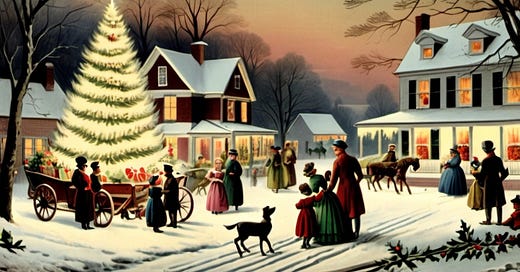In Praise of Tradition
Tradition comes down to us as fraught fruitcake of history, effort, trouble, and a nonzero amount of wisdom.
When speaking of “the Way,” the earliest Christians often referred to the idea of a “rule,” with the connotation of a straight edge that serves as a reference when you’re drawing a straight line.
A “rule” is not a top-down set of edicts enforced by one person or group dominating another through force of will. It is more of a guide that one takes up oneself, because when it’s abided it leads to the smoother, straighter path, and when it’s deviated from leads to a fraught path.
These days, when we think of the idea of a rule, we often think in terms of what can go wrong. Taut pronouncements, joyless stringency; alienation and rejection. We’ve spent more than a generation making films and telling stories that increasingly depicted institutional discipline as imperial and totalitarian, vilifying any champion of the status quo and revering the mavericks.
But it’s worth noticing how common the idea of a rule actually is. If you place any value on any way of being that is different than your own day-to-day way of being, then I think you’re in the territory of thinking about a rule. Almost unavoidably, I think, it involves some process of constraint. It’s worth noting that the entire Vedic system of personal growth is circumscribed by the term yoga, for instance — which is a reference to a “yoke,” i.e., the kind of harness that you put on an animal to have it do useful work for humans.
One of my favorite value systems these days Ken Wilber’s Integral Theory — which is, among other things, a sort of warehouse of various stage theories of development — Spiral Dynamics, Jean Gebser’s structures of consciousness, Kohlberg’s stages of moral progression, Fowler’s stages of faith development, etc., etc. Each of these attempts to describe a process of evolution from less sophisticated, less life-giving modes of being to more sophisticated, more life-giving modes. The inevitable question arises, what are the most effective ways of getting from where one is to where one wants to be?
Each of these theories, in its way, might harken to some form of a “rule,” in the absolute broadest sense — some method by which folks may transition from one stage to another. Ken Wilber is in favor of these. He calls for “conveyor belts,” which help people to shift from a starting mode of being to a more effective one, and he talks about the value of creating more and more of them. Ideally, these are living, flexible endeavors. Best practices are identified through a process of iteration. The results of various forms of experimentation are recorded and built upon. The people shift; the values shift, the modes of pursuing those values shift. Repeat.
It sounds exciting, doesn’t it? If so, then it’s also worth noting that this process has already been occurring for millennia, however imperfectly. This is oversimplifying a bit, but I think the resulting, evolving gestalt of an effort like this could be called a tradition.
We live in a time of tremendous change, which appears as a series of crises: a crisis in democratic norms; a related “Red-Blue” crisis, which itself intersects numerous other social crises; a growing geopolitical imperialism crisis; a wealth gap problem; a climate crisis at the tip of a deeper iceberg (no pun intended) of a consumption crisis.
These crises are compounded by the nagging feeling that the institutions you’d hope would guide the response are no longer congruent to any problem that we’re facing, and are actually kind of dead.
I think it’s worth considering that this situation — like most problems today — is double-edged. On the one hand, many institutions, at least ostensibly, have an apparently stale, stodgy quality to them. But on the other hand, it’s hard to imagine stewarding the kind of growth we mostly feel we need — growth at scale — without institutions. And the most accessible and comprehensive primers of the propositions we need for collective growth — i.e., some of the most original and shopworn wisdom — are often going to be found within already-existing traditions.
Take, for instance, Christianity, which is the tradition that I’ve been studying the most recently, and to which I (more or less) feel I belong. It’s worth noting that a basic fluency in the propositions of Christianity is a surprisingly complete approach to the world. And as people today continue to meditate on these propositions, what they discover continues to be deep, fruitful, and life-giving.
A cursory glance backward suggests that history is a long, quaint comedy of errors. But a closer look reveals people with brains and hearts not dissimilar to ours, living in different contexts but skating their own precipices of the unknown — and, often, doing it well. The muscularity of those who wrestled best with the problems of another age remains something to admire, and it can still inform our approach to our own challenges. And the hindsight with which we can look at the problems of the past translates to a certain instant hindsight for us today.
Notice, for instance, that Augustine wrote his City of God after Rome had fallen. Or that Saint Teresa had transcendent experiences in an Avila whose main thoroughfare was frequently paraded by bandits. We can learn about living in peace, toward the sacred, in rough times. We can learn about the tender shoots toward civil society that sprout perennially, like grass after a fire.
Notice that the existential questions that drove Thomas Aquinas or Dionysius the Areopagite can still be foundational to our own theological approach.
Notice that the first existentialists were still theistic Christians, still resonated with something perennial in these archetypes. And Tolstoy. And Gurdjieff. What fed and comforted them?
Notice the cycles of corruption and reform that rocked the Church. The waves of monasticism that arose in response — each, essentially, the “tune in, drop out” movement of its day. Anthony, Benedict, Francis, Dominic. Notice the Beguines and other lay devout, finding great leverage on the world — and independence — simply through ardent spiritual pursuit. The revivals of Pietism and the Great Awakening.
Drink in all of the mystics: Hildegaard, Julian, Catherine; John of the Cross, Eckhart, Ruysbroek, etc. Or watch the tradition propagate, subtly, socially, in Balzac, Austen, Dickens, George Eliot.
Approach the modern era. Notice Albert Schweitzer’s groundbreaking search for the “historical Jesus.” Notice (but don’t totally ascribe to) Albert North Whitehead’s fascinating vision of process. Notice the incisive giant, Paul Tillich.
Notice the development of liberation theology and its deepening argument for true right relations between humans.

A tradition is vast and rich, and it inflects us in ways we don’t even notice. Plugging to a tradition doesn’t have to file us down with conformity; it can actually help to give us part of what we really are.
Want to experiment? If you’re open to Christianity at all, I’d encourage you to read Practicing the Way by John Mark Comer. I don’t entirely agree with Comer on every last point. But I wonder if you won’t find what I found in that book, which is a surprisingly comprehensive system for living a day-to-day life that is increasingly clean, loving, and cosmically-minded — an approach that is welcoming, relaxed, forgiving and, at the same time, formative. It gives a great taste of what it can mean to grow within a living evolving tradition. I think it is, in many ways, tradition at its best.
Also, whichever of the “Big Five” religious traditions you consider to be the ambient one of whatever you consider to be your culture — Judaism, Christianity, Islam, Buddhism, Vedanta — I’d encourage you to deeply learn the ideological and sociopolitical history of that tradition. For most folks reading this, that would be the history of the evolution of the Judeo-Christian tradition — in which case I think Justo Gonzales’s two-volume The Story of Christianity is a wonderful text.
I think it simply must be seen that study of religious history is not the study of silly, dead, old temples. It is the study of the very effort of humanity to grow itself, in an organized way, within a truly cosmic framework.
In this Christmas season — this foundational showcase of Christendom — I celebrate the ways tradition can weave its way into culture and consciousness. I invite you to celebrate, too.



